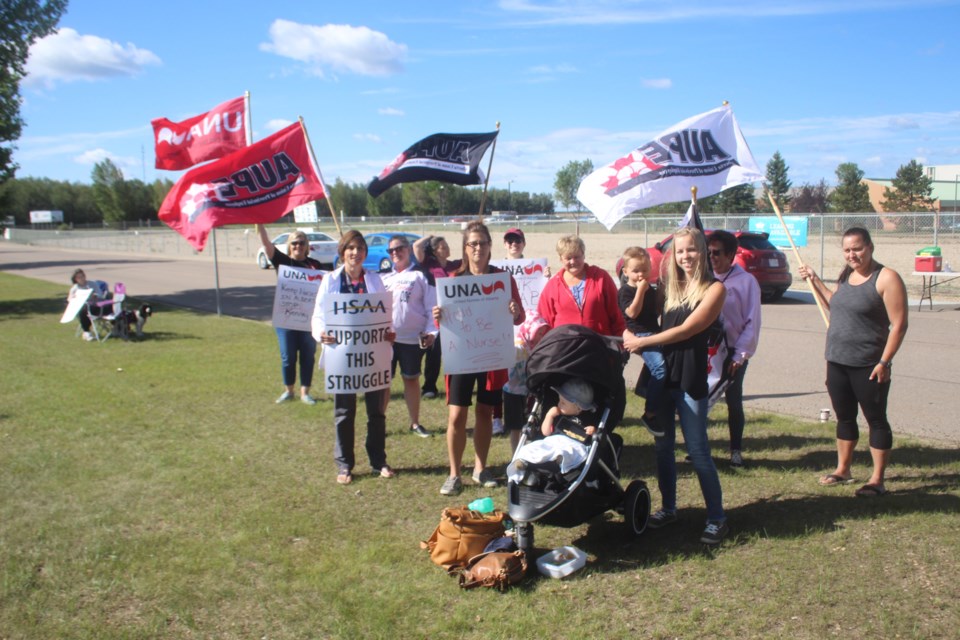WESTLOCK – Twenty-four hours in advance of a provincial ‘day of action’ organized by the United Nurses of Alberta (UNA), a small group of nurses and supporters from other unions staged a demonstration east of the Westlock Healthcare Centre Aug. 10 to protest the provincial government’s plans to cut wages and institute layoffs.
At the onset there were about a dozen protestors, though that number changed as the morning and afternoon wore on. The bulk of those protesting were members of UNA Local 73, though there were also members of the Alberta Union of Provincial Employees (AUPE), the Health Sciences Association of Alberta (HSAA) and a few others demonstrating in solidarity.
Rachael Schiller, president of UNA Local 73, said the reason they held the rally a day ahead of the other protests at over two dozen hospitals across Alberta was because many of their local members wouldn’t be available Aug. 11.
In a prepared statement, Schiller said the purpose of the demonstration was to help educate the public on what is happening to front line health care workers.
“The pandemic has caused lots of challenges for nurses in Alberta, as well as across the country. Now the Alberta government has announced cutbacks and layoffs that are unacceptable and unsafe for both nurses and patients,” she said.
"Nurses go to work every day to make sure Albertans get the safest, most compassionate, empathetic and benevolent care possible. What we want in return from our employers and the government.”
Negotiations have been going on for several months between the province and UNA over a new collective agreement, though as Schiller noted, “it seems that there has been little progress.”
In a statement issued in response to the information pickets, finance minister Travis Toews said Alberta Health Services (AHS) proposed informal mediation to the UNA two weeks ago in an attempt to move towards a settlement agreement, but union leadership declined.
Toews noted that in the past 21 years, seven of the eight collective agreements between AHS and UNA have been reached with the use of a third-party mediator, but it was hoped that informal mediation would allow the two parties to work collaboratively towards a deal.
In early July, it was widely reported in provincial media that AHS was asking nurses to take a three per cent pay cut in order to bring down health care spending.
Toews pointed out that Alberta spends more money on health care per person than other large provinces, and this simply can’t continue.
“We are facing a $93 billion debt, and we spend more than half of the province’s operating budget on public sector compensation,” he said.
“We must continue to find efficiencies across the public sector — it’s an essential piece to restoring fiscal health and ensuring sustainable public services.”
Schiller suggested that more nurses are working overtime in response to staff shortages — sometimes when positions are advertised, they received no applicants.
“It has become (part of the) culture of nurses to get burnt out from poor working conditions, causing them to frequently change positions or places of employment,” Schiller said.
Nurses are particularly exhausted and overworked after 16 months on the frontlines of the COVID-19 pandemic, she said.
“If the government wants nurses to work less overtime, they should hire more nurses and improve working conditions, not lay more off and make pay cuts.”
However, Schiller noted that money is not the only issue in these talks, as the United Conservative Party (UCP) government also wants to roll back provisions that nurses have had for decades.
One of the provisions the province seems to chop is a “very important rule” that states a registered nurse or registered psychiatric nurse are in charge of hospital units, Schiller said.
"If nurses are no longer permitted to do this, then patient care in Alberta could become uncoordinated, backlogged, and many patients could fall through the cracks,” she said, noting that nurses generally act as the middleman between many health care specialties.
She suggested that Albertans who support their cause should write letters to newspapers, stay updated on social media and bring attention to this issue where they can.
“You might not feel like healthcare issues will affect you. We urge you to think of your children, your parents and your grandparents. Health disparities have no boundaries, and you could find yourself relying on a broken system to determine the future of your health and wellbeing,” she said.
Toews said that the province knows the appreciation and respect for health care workers runs deep and wide throughout the province.
“As bargaining continues, my hope is that unions and their employers can quickly come to a settlement that works for everyone, and is aligned with the fiscal realities we are facing.”



